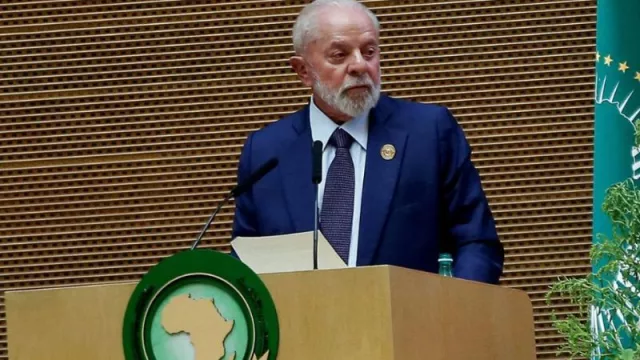Impact in America: A Biased and Fanatical Ideology?
Israel's reaction to Lula's remarks has triggered a series of reflections on coherence and ideology in Latin America and the world. Why are certain groups defended while freedoms are disregarded? Why doesn't Lula, for example, say anything about Maduro's totalitarianism or Cuba? Where does the sense of coherence lie in international politics?
The recall of the Brazilian ambassador in Tel Aviv and the summoning of the Israeli diplomatic envoy in Brasilia highlight growing tensions in the region and raise questions about the nature of relations between Latin America, Israel, and the Middle East.
Tips for Analysis:
Recognizing the Importance of Context: It is essential to understand the historical and political complexities surrounding international conflicts before making sensitive comparisons. How can political leaders address delicate issues without trivializing past tragedies?
The Power of Words: In an increasingly connected world, the words of political leaders can have a significant impact on relations between countries and public perception. What is the role of responsibility in political discourse?
The Need for Ideological Coherence: In a polarized political environment, ideological coherence and commitment to fundamental values are essential for building strong international relations and fostering global stability. How can political leaders maintain ideological coherence without compromising international diplomacy?
Understanding the Implications:
From a social perspective, emotionally charged words and comparisons can trigger intense emotional responses in the human brain. It is crucial to consider how these statements are perceived and processed in different audiences and cultural contexts.
Is marked ideological bias present in a leader like Lula? A call for reflection and constructive dialogue.
The incident between Israel and Lula highlights the importance of open and respectful dialogue between political leaders and nations. It is essential that public statements are carefully considered and that mutual understanding based on respect and empathy is promoted.
"We will not forget or forgive. It is a serious anti-Semitic attack. On my behalf and on behalf of the citizens of Israel, tell President Lula that he is persona non grata in Israel until he retracts," said Israeli Foreign Minister Israel Katz to the Brazilian ambassador, according to a statement from Katz's office.
Ultimately, the incident between Israel and Lula underscores the need for a reflective and balanced approach in international political arena, where ideological differences can be addressed with respect and mutual understanding.
Israel accused Lula of trivializing the Holocaust and offending the Jewish people, and Katz had summoned the Brazilian ambassador to reprimand him for his comments.
Questions that Society Must Address:
What is the impact of this diplomatic incident on America and its international relations?
Is it necessary to recognize bias and fanaticism in left-wing ideology after this event? Has the time come for the "left" to reconsider many of its dogmas and positions?
Has the time come to review fanatical ideologies in the global political landscape?
Is there a disparity in defending terrorist groups like Hamas and, on the contrary, not defending political figures like Corina Machado in the fight for free elections in Venezuela?
Where does the sense of coherence of the left lie in the world and in Latin America amid these diplomatic and political controversies?
Lula compares Israel and Gaza to Hitler and the genocide of Jews, but does not say anything about Maduro and his crimes against humanity. Is it time for Latin American leaders, politicians, and political parties to humanize criteria of freedom, justice, democracy, and social peace, regardless of their party affiliation?
Is it time to end "fanatical ideological militancy"?
IN Dossier:
Israel's military response to Hamas's attack on October 7, the trigger for the current war, continues to spark political sparks in international politics. Israel declared on Monday the president of Brazil, Luiz Inácio Lula da Silva, persona non grata and closed the door to the country until he rectifies his statements from Sunday in which he compared the Gaza war to the Holocaust.
Israel declared Lula "persona non grata," withdrawing its ambassador, President Luiz Inácio Lula Da Silva, until he retracts his comments comparing the war against Hamas in Gaza to the Holocaust during World War II.
The Brazilian president said it was not "a war of soldiers against soldiers" but "a war between a highly prepared army and women and children."
Brazil's measures, including the summoning of the Israeli ambassador for discussions, were confirmed by the Brazilian Ministry of Foreign Affairs on Monday, after Israeli officials formally reprimanded the ambassador of the South American nation following Lula's comment on Saturday.
"What is happening in the Gaza Strip with the Palestinian people has no parallel in other historical moments. In fact, it did when Hitler decided to kill the Jews," Lula told reporters during the 37th African Union Summit in Addis Ababa.
The Brazilian president went further and stressed that it was not "a war of soldiers against soldiers" but "a war between a highly prepared army and women and children."
"It is a trivialization of the Holocaust and an attempt to attack the Jewish people and Israel's right to self-defense. Establishing comparisons between Israel and the Nazis and Hitler is crossing a red line," Netanyahu evaluated, for his part, in a statement.
Meanwhile, Israeli Defense Minister Yoav Gallant also criticized Lula on the same social network for supporting, he said, "a genocidal terrorist organization, Hamas, and by doing so, embarrassing his people."
The Gaza war began when the Palestinian Islamist militant group Hamas sent fighters to Israel on October 7, killing 1,200 people, mostly civilians, and kidnapping 253 hostages, according to Israeli counts.
Since then, Israel's aerial and ground offensive has devastated much of Gaza, killing more than 29,000 people, mostly civilians, according to Palestinian health authorities, and forcing almost all of its more than two million inhabitants to flee their homes.
(With information from Reuters)












Tu opinión enriquece este artículo: